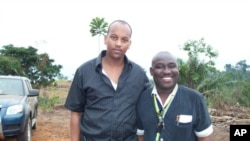A special adviser to Gabon’s leader told VOA the construction of the Special Economic Zone (SEZ) forms part of President Ali Ben Bongo Ondimba’s plan to make the country competitive and provide jobs to thousands of Gabonese.
Soleman Liban said the government signed a strategic agreement with Singapore-based OLAM International, to jointly develop a special economic zone (SEZ) at Nkok for timber processing.
“The purpose of this project is to create a Special Economic Zone that will allow (us) to gain (a) competitive advantage for the Gabonese wood processing industry for second, third-level transformation. The objective was to create a platform that will allow all the industries worldwide to come to Gabon, (and) be able to reach economy of scale,” he said.
Liban also said that the government has an objective to industrialize Gabon and to create a pool that will stimulate all the peripheral activities for the Special Economic Zone.
This comes after President Bongo Ondimba recently banned all forms of commercial “raw” logging in that Central African country.
Under the agreement, OLAM, an agricultural products processor, will invest $12 million in the SEZ development project for a 60 percent stake in a joint venture, while the Gabonese government holds the other 40 percent.
According to OLAM, the company owns 400,000 hectares of forestry concessions for tropical hardwoods in Gabon. The joint venture with Gabon to develop a SEZ for timber processing supports OLAM’s interest to expand its forestry concessions and timber processing activities in the west central African country.
Liban said the Gabon’s Special Economic Zone offers developed infrastructure and fiscal incentives for the timber industry to invest in timber processing activities.
“There is an estimated 7000 direct employment. If you consider indirect employment, meaning small enterprises, the Gabonese people that will be able to supply the Special Economic Zone, they will be able to supply the industrial hub. It will generate profit. And obviously, if you look at it, there is a secondary economy created around the Special Economic Zone like this and we will be able to create the stimulus that is needed to optimize and drop costs,” Liban said.









